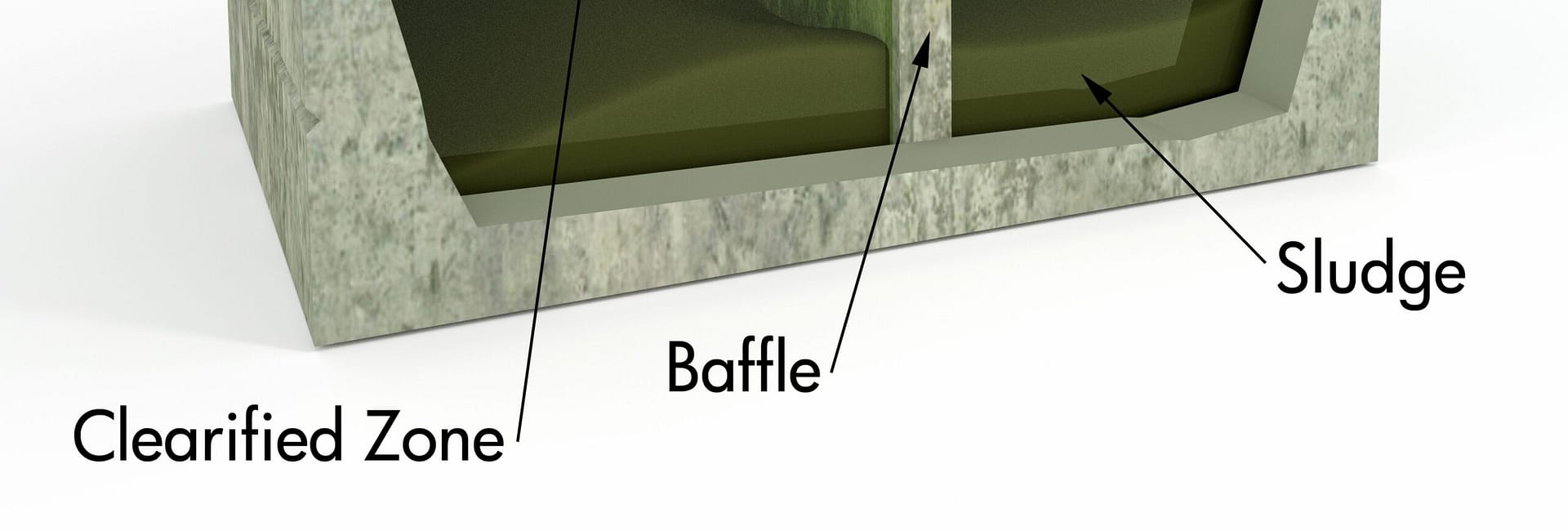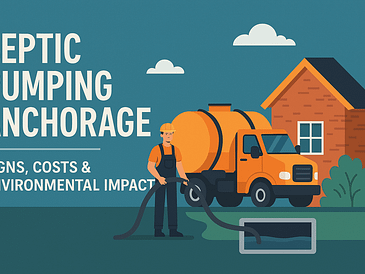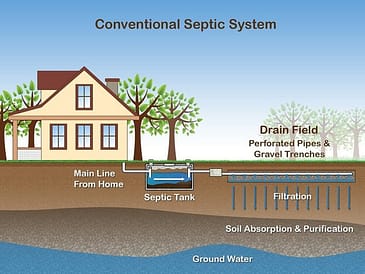Septic tanks are an essential part of the septic system, which is responsible for treating and disposing of household wastewater. It’s crucial to keep your septic tank well-maintained to prevent any potential issues. One of the key aspects of septic tank maintenance is knowing when your tank needs to be pumped. In this article, we will discuss how to tell if your septic tank is full and the signs to look out for.
Understanding Septic Tanks
What is a Septic Tank?
A septic tank is a large underground tank made of concrete, fiberglass, or plastic that is designed to hold and treat wastewater. It is usually connected to the drain field, where the treated effluent is further treated and dispersed into the soil. Septic tanks are commonly used in rural areas where centralized sewer systems are not available.
What Happens if a Septic Tank Gets Too Full?
If a septic tank gets too full, it can lead to various problems and potential damage to the septic system. When the tank exceeds its capacity, the solid waste and sludge inside the tank can clog the drain field pipes, preventing the effluent from properly dispersing into the soil. This can result in sewage backup in your home, unpleasant odors, and environmental contamination.
Signs of a Full Septic Tank
It is essential to recognize the signs that indicate your septic tank is full and needs to be pumped. Ignoring these signs can lead to costly repairs and potential health hazards. Here are some common signs to watch out for:
Pooling Water
If you notice pooling water around your septic tank or drain field, it could be a sign that your septic tank is full. The excess wastewater has nowhere to go, causing it to rise to the surface.
Slow Drains
A septic tank that is nearing its full capacity may cause slow drains in sinks, toilets, and showers. If you experience frequent clogs or slow draining water, it could be an indication that your septic tank needs to be emptied.
Odors
Unpleasant odors emanating from drains, toilets, or near the septic tank area can suggest that the tank is full and needs to be pumped. Foul smells are often a result of the accumulation of solid waste and sludge inside the tank.
Lush Grass Above the Tank
If you notice an unusually lush and green area above your septic tank or drain field, it could be a sign that your septic tank is leaking or overflowing. The excess nutrients from the wastewater act as fertilizer, promoting the growth of vegetation.
Sewage Backup
A telltale sign of a full septic tank is sewage backup in your drains, toilets, or showers. If you experience frequent backups or gurgling sounds, it’s crucial to address the issue promptly to prevent further damage.
Gurgling Sounds
Strange gurgling sounds coming from your drains can indicate that your septic tank is struggling to handle the influx of wastewater. This could be a sign that the tank is full and needs to be pumped.
Weak Flushing
If you notice weak flushing of toilets or poor water pressure, it may be a sign that your septic tank is full and needs to be emptied. Insufficient space in the tank can restrict the flow of water, resulting in weak flushing.
Checking if Your Septic Tank is Full
Steps to Check if Your Septic Tank is Full
If you suspect that your septic tank is full, there are a few steps you can take to check the tank’s capacity:
1. Locate your septic tank access lid, which is typically located outside your home near the tank. It may be buried underground, so you may need to probe the ground or check the property’s documentation for its exact location.
2. Once you locate the access lid, open it carefully. Use a flashlight to inspect the tank’s depth. If the tank is filled to its maximum capacity, you will be able to see the level of wastewater inside the tank.
3. If you are unsure about the tank’s capacity or suspect any issues, it is recommended to contact a professional septic service provider to perform an inspection and provide appropriate recommendations.
Importance of Septic Tank Pumping
Regular septic tank pumping is essential for maintaining a healthy and properly functioning septic system. It is recommended to have your septic tank pumped every 3 to 5 years, depending on the household size and water usage. Pumping removes the accumulated solid waste and sludge from the tank, preventing potential clogs, backups, and system failures.
11 Things you Should Never Put Down the Drain
It is essential to be mindful of what you dispose of down the drain, as certain substances can cause severe damage to your plumbing system and the environment.
There are 11 things you should never put down the drain to avoid potential problems and costly repairs.
Firstly, cooking oil and grease should never be poured down the drain as they solidify and can clog the pipes.
Similarly, coffee grounds can accumulate in the drains and cause blockages over time.
Additionally, medications should not be discarded this way as they can contaminate the water supply.
Similarly, cleaning products containing harsh chemicals should be avoided, as they can corrode the pipes and harm aquatic life.
Other items to steer clear of include cat litter, hair, and dental floss, which can all lead to blockages.
Toilet paper should be the only tissue put down the toilet, as tissues and paper towels do not break down easily and can cause plumbing issues.
Lastly, paints, solvents, and pesticides should never be disposed of down the drain, as they can pollute water sources.
By being conscientious about what goes down the drain, you can prevent plumbing mishaps and contribute to a healthier environment.
Frequently Asked Questions
I just had my septic tank pumped, and it is full again. Why?
If your septic tank fills up quickly after being pumped, it may indicate an underlying issue such as a clog in the drain field or excessive water usage. It’s important to investigate further and contact a septic service professional to diagnose and address the problem.
Will my toilet flush if the septic tank is full?
If your septic tank is completely full, your toilet may not flush properly or may show signs of weak flushing. It is essential to address the issue promptly to prevent backups and potential damage to your septic system.
What about home remedies for a backed-up septic tank?
While there are various home remedies suggested for a backed-up septic tank, it is important to proceed with caution. Home remedies can sometimes worsen the problem or cause damage to the septic system. It is recommended to consult with a professional septic service provider for appropriate solutions.
How much does it cost to empty a septic tank?
The cost of emptying a septic tank can vary depending on several factors, such as the tank’s size, location, and regional pricing. On average, septic tank pumping can cost anywhere between $200 to $800. It is advisable to contact local septic service providers to get accurate cost estimates.
Can I shower if my septic tank is full?
If your septic tank is full, it’s important to reduce water usage until the tank is pumped. Taking showers, especially long ones, can contribute to the tank’s already high water level and potentially result in backups or overflows.
What does a full septic tank look like?
A full septic tank will have the wastewater level reaching or even surpassing the entrance pipe or manhole cover. If you open the access lid and see the wastewater at or near the top, it is a clear sign that your septic tank needs to be emptied.
How long does a septic system last?
A septic system is an essential component of a property’s wastewater management. The lifespan of a septic system depends on various factors, including its design, installation, usage, and maintenance. Generally, a well-maintained septic system can last for 20 to 30 years. However, some systems have been known to last longer with proper care. Regular maintenance is crucial for the longevity of a septic system. The frequency of maintenance, such as pumping out the tank, will depend on the size of the tank and the number of occupants in the property. Typically, septic tanks should be pumped every three to five years, but this may vary based on individual circumstances. Proper usage is also important in extending the lifespan of a septic system. Overloading the system with excessive water usage or disposing of non-biodegradable items, such as diapers or sanitary products, can cause blockages and significantly shorten its lifespan. In addition to maintenance and prudent usage, factors like soil type, location, and climate can also influence the longevity of a septic system. Regular inspections and adherence to best practices are essential to ensure a septic system lasts as long as possible.
Tips for Avoiding a Full Septic Tank
To prevent your septic tank from reaching its full capacity too quickly, consider following these tips:
1. Conserve water by fixing leaky faucets and running appliances such as dishwashers and washing machines with full loads.
2. Avoid pouring grease, fats, and oils down the drains, as they can clog the pipes and contribute to the accumulation of solid waste in the tank.
3. Do not flush non-biodegradable items such as wipes, feminine hygiene products, or paper towels down the toilet. Only toilet paper designed for septic systems should be flushed.
4. Use septic-safe cleaning products and avoid harsh chemicals that can disrupt the septic system’s balance and kill beneficial bacteria.
5. Regularly inspect your septic system for any signs of leaks or damage. Addressing issues promptly can prevent more significant problems in the future.
Choosing a Reliable Septic Company
Choosing a reliable septic company is essential to ensure that your septic system is properly installed, maintained, and repaired. Here are some tips to help you choose a reliable septic company:
1. Research and gather information: Start by researching different septic companies in your area. Look for companies that specialize in septic services and have years of experience in the industry. Check their websites, read customer reviews, and look for any certifications or affiliations they may have.
2. License and insurance: Verify that the company you are considering has a valid license to operate in your area. This ensures that they meet the required standards and regulations. Additionally, it’s important to choose a company that has liability insurance and worker’s compensation insurance to protect you and their employees in case of accidents or damage.
3. Ask for recommendations: Seek recommendations from friends, family, or neighbors who have recently had septic services done. They can provide valuable insights and first-hand experiences with different septic companies.
4. Range of services: It’s advantageous to choose a septic company that offers a wide range of services, including installation, maintenance, pumping, repair, and emergency services. Having all your septic system needs addressed by one company can save you time, money, and potential coordination issues.
5. Experience and expertise: Look for a septic company with experienced and knowledgeable technicians. Ask about their qualifications, certifications, and ongoing training. A reputable company will have skilled technicians who are familiar with different types of septic systems and can diagnose and address any issues effectively.
6. Transparent pricing: Request estimates from multiple septic companies, and compare their prices and services. Avoid companies that provide vague or overly low quotes, as they may resort to hidden charges or subpar workmanship.
7. Positive customer reviews: Read online reviews and testimonials from previous customers to gauge their satisfaction level with the company’s services. Look for consistent positive feedback and reviews that mention the company’s professionalism, reliability, and quality of work.
8. Response time and availability: Emergencies can happen with your septic system, so it’s important to choose a company that offers emergency services and has a quick response time. Make sure to inquire about their availability and response time during regular business hours as well as after-hours or weekends.
9. Environmental responsibility: A reliable septic company should prioritize environmentally friendly practices. Inquire about how they handle wastewater and whether they follow proper disposal techniques.
10. Warranty and guarantees: Check if the septic company offers any warranty or guarantees on their work. This ensures that they stand behind the quality of their services and are willing to resolve any issues that may arise after the work is completed.
By considering these factors and conducting thorough research, you can choose a reliable septic company that meets your needs and ensures the longevity and functionality of your septic system.
When it comes to septic tank pumping and maintenance, it’s vital to choose a reliable and professional septic service provider. Look for a company with a solid reputation, experience, and proper certifications. Consider asking for recommendations from friends, neighbors, or real estate professionals who have used septic services in the past.
Above Ground vs. Underground Septic Systems:Which is Right for You?
When it comes to choosing a septic system for your property, there are two main options: above ground and underground systems. Each option has its own advantages and disadvantages, so it is important to carefully consider your specific needs and circumstances before making a decision. Above ground septic systems are typically more affordable and easier to install than underground systems. They are also easier to access for maintenance and repair purposes, as they are located at ground level. However, above ground systems may not be suitable for all properties, as they require sufficient space and may not be aesthetically pleasing. On the other hand, underground septic systems offer a more discreet solution, as they are buried underground and out of sight. They also tend to have a larger capacity and can handle a higher volume of wastewater. However, underground systems are generally more expensive to install and may be more difficult to access for maintenance and repairs. Additionally, the installation process may require more excavation and landscaping work, which can add to the overall cost. Therefore, it is important to consider factors such as space availability, budget, and maintenance requirements when deciding between above ground and underground septic systems.




